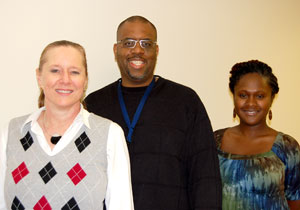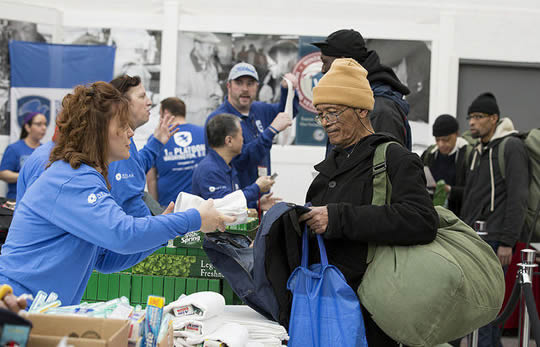By Stephen Spotswood

Kevin Morton, center, was recognized recently by National Association of Social Workers (NASW) with an “Outstanding Achievement” award. Here he is shown with two colleagues who also received the award: Elsie Moore from Physical Medicine and Rehabilitation, left, and Anita Mingo from the Caregiver Support Program.
WASHINGTON—During the Vietnam War, in order to help battle-weary soldiers obtain a moment of reprieve from combat operations, the military held stand downs at secure base camps. There, troops were able to obtain clean uniforms, get medical and dental care, take care of basic hygiene and enjoy the camaraderie of fellow servicemembers without the danger of being shot at. For the last 20 years, the same structure has been used by VAMCs and veterans organizations across the country to provide that same kind of service to homeless veterans.
Kevin Morton, who runs the Health Care for Homeless Veterans Program (HCHV) at the DC VAMC Center, has the daunting job of coordinating Winterhaven—DCVAMC’s annual stand down for homeless veterans. A licensed social worker, Morton is a Marine Corps veteran and has been working with homeless veterans since before he came to VA 16 years ago.
“I was working part-time at a shelter in DC and met one of the VA outreach workers—a nurse from the DCVAMC,” he explained. “She told me a little about their program, and I thought that sounded pretty cool, so I applied and was hired to work in the medical center’s homeless program.”
While the HCHV was initially formed as a way to contract with providers for community-based residential treatment for homeless veterans, it now serves as a hub for a wide variety of healthcare, housing and other services. The Winterhaven event is a physical manifestation of that multifaceted focus.

At the Winterhaven event held yearly at the DC VAMC, homeless and at-risk veterans can find access to medical and mental health services, social services, legal advice, as well as receive donated coats and boots, haircuts, toiletries, and free meals. VA photo.
At the event held yearly at the medical center, homeless and at-risk veterans can find access to medical and mental health services, social services, legal advice, as well as receive donated coats and boots, haircuts, toiletries and free meals. Representatives from the IRS will come to help veterans with their taxes. Employees of the Veterans Benefits Administration will be on hand to lead veterans through the process of applying for benefits. The event even includes a job fair to help veterans find employment.
“It’s really a massive collaboration between the homeless program and volunteer services,” Morton said. “We start the planning process in September, identifying all of the community partners we’d like to attend. And every year we get a couple more people. Once they’re all signed up, we figure out all the services we want to provide and all the donations and money that we’ll need to provide it.”
Morton and his team work with restaurants in the community to donate food, or they get sponsors to pay for it. They work with partners who buy new boots to supplement donations. They’ve even partnered with local dry cleaners, who will dry clean donated coats.
“Our planning committee—we do a lot of the logistics,” he explained. “We go through the hospital looking at where we’re going to place everything, making sure all the vendors have everything they need, meeting with all these folks and putting it all together.”
Then there is the task of making sure homeless and at-risk veterans know about the event. Flyers are posted in shelters and soup kitchens, and the HCHV outreach teams go out to talk to veterans in the community, as well as those living in transitional housing. On the day of the event, shuttles will go back and forth between shelters and transitional housing, making sure veterans can physically get to the medical center.
“Veterans come to Winterhaven and get engaged with the VA, and they tend to stay connected with VA,” Morton said. “What we still run into is people who don’t know they’re eligible for services. Many people think that you need to have been in a conflict to get VA services, but you only need to have served. Also, it seems every year, we get a couple veterans that we do testing on during the event and find their glucose is high or their cholesterol is high and we send them right to the emergency room to be taken care of.”
Last year, Winterhaven served 803 veterans. The year before that, it was 790. This reflects a steady increase in turnout over the past few years but doesn’t necessarily mean the homeless veteran population in the city is growing proportionally. “The event is geared for homeless vets and previously homeless vets—those who are in transitional housing or at-risk. A lot of the services being offered also benefit them.”
However, Morton is seeing the numbers start to creep back up, though he admits that might be specific to Washington, DC. It’s one of the few cities that has a “right to shelter,” which ensures homeless have a legal right to housing when temperatures fall below freezing. This result is spikes in homeless people traveling to the city from Maryland and Virginia. Homeless veterans are also drawn to DC because of an erroneous belief that being near the seat of the federal government will result in their benefits being processed more quickly.
Finding appropriate housing for homeless veterans remains one of HCHV’s biggest challenges. The program has almost 1,500 HUD-VASH vouchers and 120 transitional housing beds, but an aging veteran population might require more support and more flexible housing programs, Morton suggested.
“The average age of our veterans is 59, but some are much older. And we’re finding that a lot of guys can’t manage a single apartment on their own,” he explained. “You’ve also got people who have been using substances since they were in their 20s. Their cognitive skills aren’t great and their ability to maintain an apartment is compromised. We also have those with significant mental health issues who could live in the community but need a little bit of support.”
“If we had options like a shared house with support staff, it would be so much more cost-effective. We could wrap services around them and keep them in the VA community as long as possible,” he added. “But we’re just not there yet.”
While there are still strides to be made, Morton said he believes VA has done amazing work in helping homeless veterans find their way back into the community. “Who else can provide all of these services in one place? Who else can do something like Winterhaven? And that’s something that’s happening nationwide,” he said.

